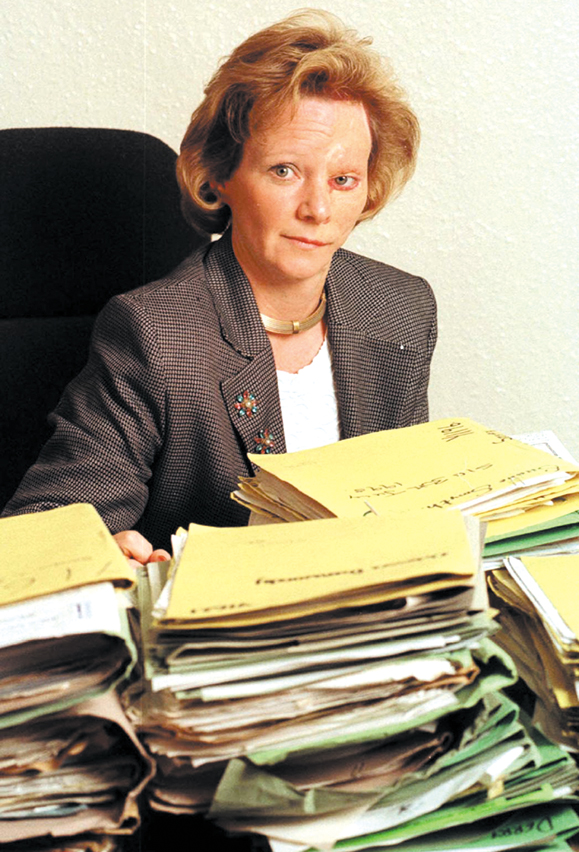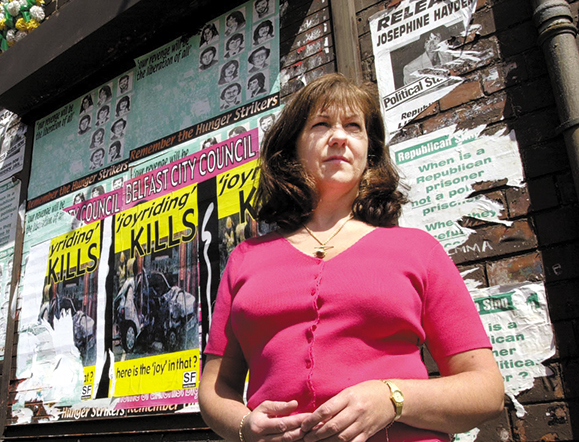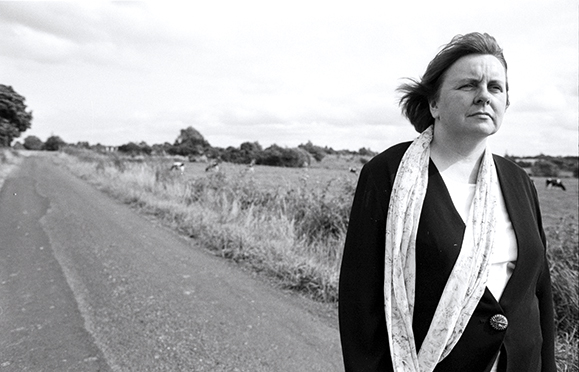In war-torn Northern Ireland, for women to fight for equal rights would have been seen as a betrayal to the Nationalist or Unionist cause, Anne Cadwallader examines the position of women on the political front post ceasefires.
The women of Northern Ireland have, in virtually every sphere of influence, through their work in the community and the trade unions, through their role as mothers and the nurturers of their families – and by vigorous participation in most of the main paramilitary groups – played a full role in both war and peace.
But there is one place where women have been absent, and that is in the higher echelons of the political parties in Northern Ireland.
Bernadette Devlin McAliskey, who now coordinates the South Tyrone Empowerment Programme, was the only woman MP to ever represent Northern Ireland. That was 30 years ago.
The last time the Ulster Unionist Party, the largest party in Northern Ireland, selected a woman candidate to run for Westminster was 1979.
In the new power-sharing Executive, the most powerful ministries were allocated to men. Because their parties nominated them last, two women, Brid Rodgers of the SDLP (Social Democratic and Labor Party) and Bairbre de Brun of Sinn Féin, were “lucky” enough to get the positions of Agriculture and Health respectively.
Sinn Féin has given two women the highprofile job of running its Washington bureau, firstly Mairead Keane and more recently Rita O’Hare, who is respected both within the party and by politicians in the U.S. and Ireland.
But while Sinn Féin claims to be more inclusive than other parties, not one woman was elected from the floor of its 2000 Ard Fheis (annual party conference).

The SDLP was not slow to point this out. “SDLP Slam Sinn Féin Gender Imbalance” gloated a party press release, in a most unsisterly fashion, the following day. Patricia Lewsley, the SDLP’s “spokesperson on gender equality,” accused Sinn Féin of scandalously paying lip service only to women’s rights.
Carmel Hanna, the SDLP assemblywoman for South Belfast, joined in the fray, claiming that Sinn Féin’s “veneer has slipped” and that their “spin machine” could not hide the party’s inability to elect women.
The SDLP has itself, however, over the years lost more than one talented, able and hard-working woman who finally gave up after not being taken seriously. Only 23 of the party’s 118 councilors are women and only three of its 24 assembly members are women.
Joan Carson is an Ulster Unionist Party assemblywoman who refuses to accept there is any sexism in her party. “That’s just a load of old nonsense, hype from the Women’s Coalition,” she snorts angrily.
“For 30 years in Fermanagh/South Tyrone, women have held the fabric of the party together. Their men have gone out to serve in the UDR and the RUC while women held the home together.
“Our party leader, David Trimble, has done more than any other to encourage women, but we’re not in favor of quotas or percentages.” Carson organized the first ever conference of Ulster Unionist women in March this year and attracted much male ribaldry (the party’s five eminently respectable assemblywomen were patronizingly referred to as “The Spice Girls”).
For all her protests to the contrary, Carson is routinely ignored at meetings by the men present and has to raise her voice and say “Hallo. Yoo-hoo. It’s me, over here – the invisible woman.”
Another UUP woman activist, May Steele, a Justice of the Peace of 40 years’ standing, once said in a newspaper interview that at an election, she did very well on first preferences, but then saw her chances slip away as the second preference votes transferred “from man to man.”
The UUP now has only one assemblywoman in its 28-strong team (another, Pauline Armitage, a hard-liner, has quit the assembly group over its support for the Good Friday Agreement).
The Ulster Unionist Council, the UUP’s governing body, has a women’s section, but of its 885 members, only 200 are women. On the party’s 108-member Executive, there are just 21 women.
One prominent supporter of women’s rights within the UUP is Daphne Trimble, the party leader’s wife. Like Pat Hume, wife of SDLP leader John Hume, Daphne is a stalwart supporter of her husband and – like Pat Hume — runs her husband’s constituency office like clockwork.
UUP women tend to be regarded as “great sports” who answer phones, lick envelopes, raise funds, tramp pavements at election time, and are then unceremoniously dumped when it comes to sharing power.

Monica McWilliams of the Northern Ireland Women’s Coalition (NIWC) says that when she was first elected to the Northern Ireland Forum (a talking shop that preceded the Assembly) it was the Democratic Unionist Party’s Nigel Dodds who shouted at her, “Shut up and sit down, you stupid woman.”
When objections were raised to this language, most other DUP members shouted they were proud to be associated with such sentiments. “We even considered pulling out in protest,” says McWilliams, “they were so abrasive and hostile.
“But we decided to stay on and to shame them into giving us some space to express ourselves. I suppose the DUP were boycotting the talks [leading up to the Agreement] and our Friday sessions of the Forum allowed them to get all that vitriol out of their systems.”
The only visible woman member of the DUP is Iris Robinson, an assemblywoman in the Strangford constituency who describes herself on her election literature as “Peter Robinson’s wife” (Robinson is deputy leader of the DUP).
Like every other party, the DUP insists women play an important role in its internal structure, claiming that almost half its members are women and 20-25 percent of the party’s executive are female.
Annie Campbell, a co-founder member of the Women’s Coalition, however, remembers McWilliams being called a “silly cow” from the DUP benches and Willie McCrea MP, the gospel-singing Free Presbyterian minister, telling her to “go home and stand by your man.”
But, Campbell says, the NIWC has finally earned respect. “We have shown them we’re no simpering ninnies, and it was heartening to hear other women in politics saying how grateful they are that we stood up to them.”
McWilliams agrees. “We were in the vanguard, we did make a difference. By our deeds, by standing for election and winning, we achieved more than a thousand academic research papers or speeches.
“We provided a home for women who had been active for years in campaigns on domestic violence, child care, tenants’ groups – women who didn’t want a tribal label, who were not visible and yet who wanted a say.”
She says she was genuinely shocked at the disrespect and hostility directed at Mo Mowlam, the North’s first and, so far, only female Secretary of State (since replaced by Peter Mandelson) – especially from the unionist parties.
“Men have worked their way into niches where they feel comfortable, as spokesmen for justice, constitutional issues and so on, and any woman who approaches them is told in no uncertain terms, `Don’t you dare step on my territory.'”
Sinn Féin’s Bairbre de Brun accepts that her party suffers from the kind of endemic sexism prevalent in society as a whole and that there is an important place for the work of the NIWC.
“It’s important in advancing women’s concerns that they have visibly senior roles in political parties and that they set agendas in women-only groups. Both are key and equally valid.”
Brid Rodgers also believes the Women’s Coalition has made a difference. “They have highlighted women’s marginalization and made it less likely that an able woman will be passed over for promotion in favor of a less able but better known man,” she says.

While they may not be taking center stage, the women in Northern Ireland have always played a strong role in community activism and continue to be active at a grassroots level. Women ex-prisoners have thrown themselves into working in the myriad of community groups that have emerged, thanks to funding by the European Fund for Peace and Reconciliation, but many, such as Martina Anderson, a former life-sentence prisoner who is now a Sinn Féin researcher at Stormont, choose to work behind the scenes rather than in the public limelight.
One of the most visible women in the North, until her brutal murder by loyalists, was the courageous human rights lawyer Rosemary Nelson who campaigned tirelessly for her clients, including the Garvaghy Road Residents Coalition in the sectarian bearpit of Portadown, County Armagh. Her high profile led directly to her murder in March 1998.
Rosaleen Walsh, who was interned for over a year in 1973-4, works as the quietly unflappable center of the frenetic Sinn Féin press office in West Belfast. Her youngest daughter was shot by a plastic bullet and will need plastic surgery into her teens to correct her jaw and saliva ducts. “My daughter’s sleep pattern has gone; she still has nightmares,” Walsh says. Another daughter, Aine, now 22, was born while her father was still in jail, and father and daughter never “bonded” until relatively recently.
Chrissie McAuley, an ex-prisoner who served a sentence in the Republic for IRA activities, is now a Belfast City councilor, and women such as Mary Nellis, early civil rights activist, now a Sinn Féin councilor for Derry, and Rosie McCorley, of Coise na n-Iarchimí (the umbrella group for republican ex-prisoners), have played critical roles in the Relatives’ Action Committees, drumming up support for prisoners issues.
Drumming up the kind of support needed to move women into the political mainstream is another matter. To this end two American women are helping. The Northern Ireland Women’s Initiative (NIWI) founded by New York-based Maureen Murray and Alexandra Lange, and funded by U.S. corporate and private donations, runs, in cooperation with the Ulster People’s College, a “Democra-she” course, which offers women practical courses in media, information and technology skills, assertiveness, speech writing and policy development. The NIWI has the support of Hillary Clinton, whose “Vital Voices” conference helped inspire it. In a letter of support the First Lady said it all when she said that a democracy in which only half the population fully participate is a contradiction. ♦


Leave a Reply